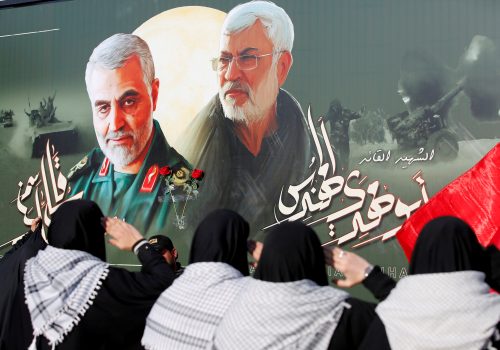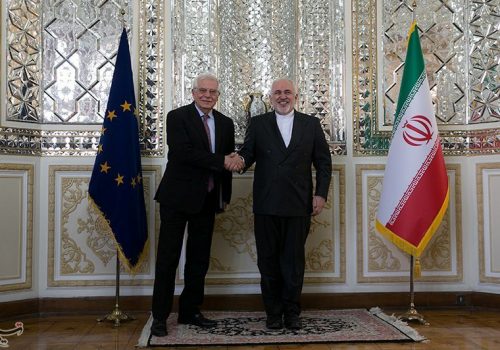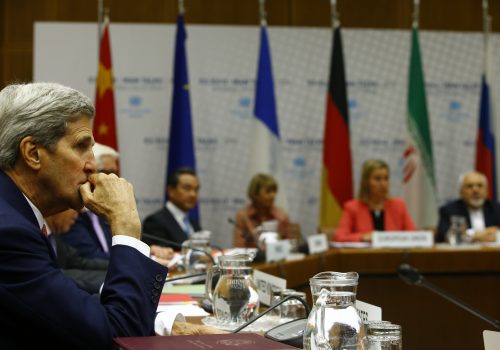Advice to Iran as a new administration takes over the White House
As someone who once tweeted at Iranian Foreign Minister Mohammad Javad Zarif, “Fix your own country first. We’ll fix ours,” after he had criticized US race relations, this analyst is a bit wary of giving advice to the Islamic Republic of Iran—or indeed any foreign government.
Still, in President-elect Joe Biden, Americans have a leader who has promised to return to international agreements and has a different vision of America’s role in the world than that of President Donald Trump. In recognition of this shift, Iran should seize the opportunity to not only resume compliance with the 2015 Joint Comprehensive Plan of Action (JCPOA), but to establish a stronger foundation for the deal and for Iran’s relations with its neighbors and the wider world.
The negotiators of the JCPOA—the US, China, Russia, Britain, France, Germany, and Iran (P5+1)—focused on constraining Iran’s advancing nuclear program but always hoped that it would be, in the words of Zarif, the floor and not the ceiling of Iran’s positive interactions with the international community. Trump’s cavalier rejection of the deal and re-imposition of draconian sanctions on Iran—at a time when it was fully complying with the agreement—interrupted the process but did not kill it.
Iran’s first job is to reverse the escalation of the nuclear program that it began in 2019 in reaction to the US withdrawal. This reversal needs to be sequenced with US sanctions relief and Biden officials and outside experts are already thinking about scenarios and timetables. It should be possible for Iran to accomplish this goal—which will involve blending down or exporting excess enriched uranium, removing advanced centrifuges, and ending enrichment at the underground site of Fordow—within six to eight weeks. Ideally, the entire process should be completed by the March Nowruz holidays to avoid bumping into a likely contentious campaign for a new Iranian president in June. The International Atomic Energy Agency (IAEA) stands ready to verify Iranian steps.
The Iranian government should also signal to the Biden administration that it accepts the principle of follow-on negotiations to address the deficiencies of the JCPOA that have become even more apparent due to the Trump administration’s withdrawal. This includes the looming expiration of limitations on Iran’s nuclear program and the ease with which a US administration was able to reverse the commitments of its predecessor. If Iran is willing to extend those limitations, the Biden administration should offer deeper and more durable sanctions relief. One way is by legislating the removal of certain key sanctions, a prospect made easier by Democratic control of both houses of Congress. Under the JCPOA, Congress is required to do so by 2023—during Biden’s first term—and Iran is obliged to ratify the Additional Protocol of the Non-proliferation Treaty.
It is also clear that there needs to be a parallel process of regional dialogue and de-escalation. While the P5+1 are the appropriate parties for negotiating any new nuclear understandings with Iran, Persian Gulf Arab partners and, indirectly, Israel and Turkey need to be involved in regional talks.
It is not necessary and probably not wise to try to convene some grand conference like the Madrid meeting that followed the 1991 Gulf War and dealt with the Arab-Israeli conflict. Proposals to create a Middle Eastern body akin to the Cold War-era Organization for Economic Cooperation and Development in Europe are well-meaning but time-wasting. Instead, new energy needs to be put into ending the ruinous Yemen war, stabilizing Iraq, Syria, and Lebanon, cooling the rift between Iran and Saudi Arabia, and reducing tensions between Iran and Israel. This will require Iranian participation in a number of different forums, some of which already exist, and strong support from the US, Europe, and the United Nations.
On the bilateral front, there is also much Iran can do to lower the temperature with the US and soften its pariah image for many Americans. Freeing long-jailed dual nationals such as Siamak Namazi and refraining from grabbing more foreign hostages is an obvious first step. Meanwhile, the incoming Joe Biden administration has promised to end on its first day in office the discriminatory “Muslim ban” that disproportionately affected Iranian travelers to the US. Biden should also give a green light to an emergency International Monetary Fund (IMF) loan to Iran for COVID-19 relief that was blocked by Trump and make it easier for Iran to access its own hard currency in foreign banks for the purchase of food, medicine, and medical devices.
One of Iran’s major disappointments with the JCPOA will not necessarily be addressed by the lifting of US sanctions. That is the reluctance of major multilateral corporations to invest in or even trade with Iran because of a lack of transparency about end users of imports and the ownership of nominally private companies. Here, the Iranian government can begin to address concerns about the opaqueness of its economy by finally approving legislation that will bring Iran into compliance with anti-money laundering and counter-terrorism regulations of the Financial Action Task Force (FATF), a Paris-based international financial watchdog.
Ultimately, of course, foreign businesses will remain hesitant to become involved with a country that has often shown scant regard for the rule of law and where unaccountable and opaque bodies, including the Islamic Revolutionary Guard Corps and various foundations and cronies of Supreme Leader Ayatollah Ali Khamenei, can intervene without warning. Iran’s poor human rights record will also remain an impediment to normal ties with Western democracies. However, Iran proved through three years of full compliance with the JCPOA that it is capable of keeping its promises when it perceives that it is in its clear interests to do so.
A country of eighty million largely well-educated people deserves to be better integrated into both its region and the international economy. The end of the Trump era and the beginning of the Biden one offer Iran and its neighbors the best opportunity they have had in years to ease conflict and tension and boost prosperity. It will take political will on all sides to turn that prospect into reality.
Barbara Slavin is director of the Future of Iran Initiative at the Atlantic Council. Follow her on Twitter: @BarbaraSlavin1.
Image: Iranian Supreme leader Ayatollah Ali Khamenei speaks during a meeting with Iranian government over economic crisis in Tehran, Iran, 24 November 2020. Photo by ParsPix/ABACAPRESS.COM


